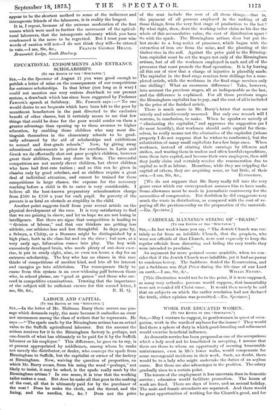EDUCATIONAL ENDOWMENTS AND ENTRANCE SCHOLARSHIPS.
[TO THE EDITOR OF THE "SPECTATOR.']
SIR,ŌĆöIn the Spectator of August 21 you were good enough to publish a letter of mine on the consequences of our competitions for entrance scholarships. In that letter (too long as it was) I could not mention one very serious drawback to our present system, a drawback which has since been suggested by Professor Fawcett's speech at Salisbury. Mr. Fawcett says :ŌĆö" No one would desire to see bequests which have been left to the poor by munificent benefactors in the past diverted to the exclusive benefit of other classes, but it certainly seems to me that few things that could be done for the poor would confer on them a greater advantage than opening up to them avenues to higher education, by enabling those children who may most dis- tinguish themselves in the elementary schools to be grad- ually advanced by the aid of scholarships and exhibitions to second and first-grade schools." Now, by giving away educational endowments in prizes for excellence in Latin and Greek we do effectually shut out poor people's children, however great their abilities, from any share in them. The successful competitors are not merely clever children, but clever children who have had first-rate tuition ; and as this can be given in classics only by good scholars, and as children require a great deal of individual attention, and cannot be trained for these competitions in large classes, the expense for the necessary teaching before a child is fit to enter is very considerable. I believe all the best-known preparatory schoolmasters charge from ┬Ż100 to ┬Ż150 a year for each pupil. So poverty of the parents is as fatal an obstacle as stupidity in the child.
Another point suggests itself from your recent article on the physical development of the race. It is very satisfactory to find that we are gaining in sinew, and let us hope we are not losing in intelligence. But there are signs that competition is leading to "division of labour," and that our thinkers are getting less athletic, our athletes less and less thoughtful. In days gone by, a Selwyn, a Chitty, or a Denman might be distinguished by a high place, both in the class-list and on the river ; but now, at a very early age, bifurcation comes into play. The boy with excessively developed brain, who needs plenty of out-door exer- cise, is put to study eight, nine, or even ten hours a day for an entrance scholarship. The boy who has no chance in this race thinks of competitions of another kind, and lets all his interest and energies go into athleticism. The consequence likely to ensue from this system is an ever-widening gulf between those who, in school phrase, are "good at games" and those who suc- ceed in competitive examinations. Trusting that the importance of the subject will be sufficient excuse for this second letter, 1






























 Previous page
Previous page